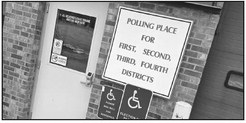Government bidding process ensures a level playing field
Star News
Editorials
There has been a lot of talk over the years about having government act more like business does.
Steps in this direction have been largely positive for taxpayers as elected leaders with business backgrounds focus on things such as increasing efficiencies, streamlining staff to prevent unneeded duplications, and the budgeting process. The challenge is that fundamentally government is not a business and there is a real danger of dismantling or ignoring safeguards built into government to be responsible to taxpayers and avoid the potential for corruption.
A good example of this is in the competitive bidding process for projects and purchases used by governments. To those unfamiliar with it, the process appears slow, cumbersome and wildly inefficient.
In a private business or someone’s home, if a roof needed to be replaced, the normal process would be to call around and check on pricing and availability. The selection process on who to get quotes from may have more to do with giving business to the guy on your softball team or who golfs with you on Thursday nights than in analyzing their workmanship or checking references.
Government entities have an obligation under state law to treat all people equally. This translates into putting large projects, such as spending more than $60,000 to replace a roof, out for competitive bids.
Typically, the government would create a list of specifications and then advertise seeking contractors who are interested and who would have to respond with their best offer by a set time. Government officials routinely include conditions to weed out fly-by-night operations, something that matters more with a roof that will last 20 years, than with hiring out who will cut the grass in the industrial park.
When the bids are opened, they are reviewed to make sure all the specifications are met with the option to accept the lowest bid that meets the requirements or reject all the bids.
While there is no doubt this drags out the process of hiring a contractor to do a job and potentially delays the start of construction, it ensures a level playing field for contractors and assures taxpayers that they are getting the best price for the tax dollars spent.
Competitive bidding is capitalism at work for the good of society. Competitive bidding process keeps contractors honest and their pencils sharp so that the company down the road doesn’t take their business. The major advantage of this system is that it puts the emphasis on the contractor’s ability to do the work rather than on their connections with decision makers.
Since things like roofs and roads rarely fail overnight, the argument claiming a need for excessive speed in hiring a contractor to get a job done falls flat and reflects more a lack of advanced planning that a project would be needed.
While at times appearing cumbersome and slow, competitive bidding is the best option for ensuring taxpayers get the best return on their money.




